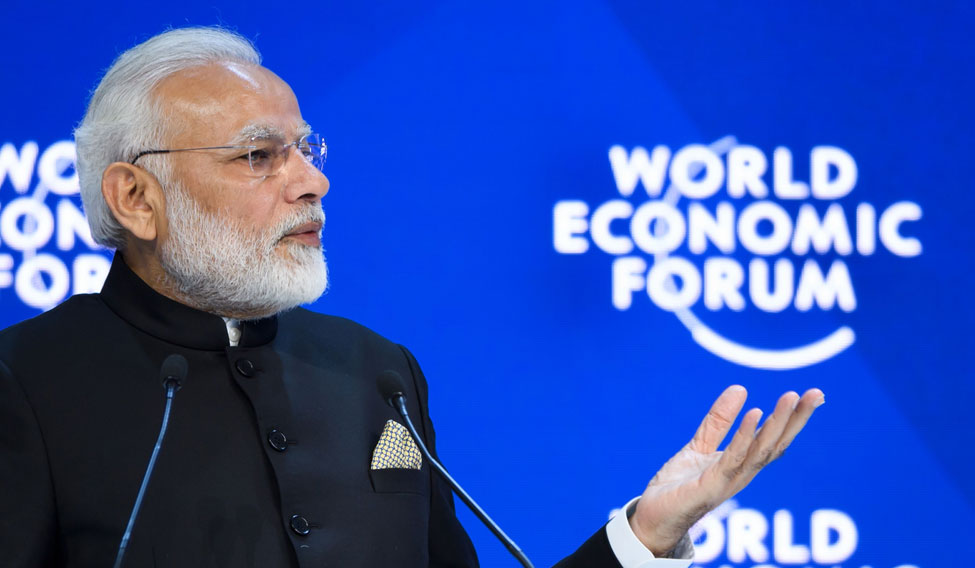Indians who heard Prime Minister Narendra Modi deliver the plenary address of the World Economic Forum in Davos can be forgiven for wondering if it was a “Man ki Baat”, albeit on another platform, to a different audience.
At home it is generally an avuncular motivational talk, but in Switzerland it was a discourse on what Modi thinks are the three biggest threats to the world at large – partly because of the theme – and how ancient India had a way of dealing with these issues, and therefore, why the world should come to India.
This visit of an Indian prime minister to the WEF comes after a gap of 20 years, the last being in 1997 by then Prime Minister H.D. Deve Gowda. Modi pointed out how different the world is now, how much stronger WEF is, and how India has transformed in the past two decades.
Modi elaborated on the huge challenges, which today's world faces, from peace, stability and security to cyber security and nuclear security, issues which possess a serious threat to humanity itself especially due to the advancement in science and technology.
By identifying climate change, terrorism and rising protectionism – “the fading away of the idea of globalisation” – Modi targeted Pakistan as well as the big powers that were playing spoilers in terms of global trade, without seeming to vent India's angst out there in Davos. Making an “artificial distinction in the form of good terrorists and bad terrorists” was worse, and even worse was the radicalisation of educated youth, he told the international audience, before talking of misplaced priorities of some nations and asserting that UN and WTO were still important.
The speech indeed had its share of classic Modi rhetorics or the Modi-isms.
While he did mention his campaign slogan – “Sab ka Saath, Sab ka Vikas” (Together with Everyone, For Everyone's Progress), in the context of how stable India is, with his party getting full majority after 30 years, Modi did not brandish numbers. However, he did mention the 1400 archaic laws that his government had scrapped and the GST which was rolled out after 70 years of independence. Demonetisation, which he recently said was the best reform his government had done, was an unmentionable there.
Another Modi-ism was “Reform, Perform and Transform”.
The Jan-dhan accounts making for financial inclusiveness, direct benefits transfer, gender justice schemes like “Beti Padhao, Beti Bachao” were presented as economic and social policies for all.
He welcomed investors without boring them with specifics, but by talking about converting red tape into red carpet, in the classic Modi-way. He invited people from all over the world to invest, tour, work, manufacure and export goods and services from India, given his government had opened the country for FDI, and 99 per cent can now come through the automatic route.
He invoked Mahatma Gandhi twice in his speech – first in the context of a need based consumption, while talking about climate change and then again when he invited the world to India. Modi did not miss the chance to take help of India's best known in a global stage.
Modi also drew from ancient Indian culture by saying that India is historically inclinced to welcome people from all over. He cited the much touted Vasudhaiva Kutumbakam – the universe is one family.
He did not talk about the infrastructure or connectivity, but he did ask the world to come to India, if they want “Wealth and Wellness, Health, Holiness and Prosperity and Peace.”
But the Prime Minister did not tell the audience at WEF – ministers, senior officials and CEOs from Fortune 500 companies included – about the next set of reforms, given the fact that Union Budget 2018 is just a few days away.
Modi may be perceived as overly strong and almost dictatorial. But in the global forum he did cling on to the ideas of democracy and diversity, which he said gave him the roadmap and template to transform India.
Whether Modi's red carpet will find takers or not is something that only time will tell, but he cannot be faulted for trying his best to give his Make in India a big push at a global economic forum.






